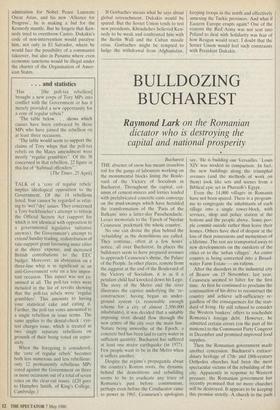. . . and statistics
'Has . . . [the poll-tax rebellion] brought a new corps of Tory MPs into conflict with the Government or has it merely provided a new opportunity for a core of regular rebels?
'The table below . . . shows which causes have been embraced by those MPs who have joined the rebellion on at least three occasions.
'The table would seem to support the claims of Tory whips that the poll-tax rebels on the Mates amendment were mostly "regular grumblers". Of the 38 concerned in that rebellion, 22 figure in this list of "habitual offenders".'
(The Times, 25 April) TALK of a 'core of regular rebels' implies ideological opposition to the Government. Of the 14 rebellions listed, four cannot be regarded as relat- ing to 'wet'/'dry' issues. They concerned a Tory backbencher's attempt to reform the Official Secrets Act (support for which is not identical with opposition to a governmental legislative initiative anyway), the Government's attempt to extend Sunday trading, redistribution of rate-support grant favouring inner cities at the shires' expense, and increased British contributions to the EEC budget. Moreover, an abstention on a three-line whip is as significant as an anti-Government vote on a less impor- tant occasion. This aspect was not ex- amined at all. The poll-tax votes were included in the list of revolts showing that the poll-tax rebels were 'regular grumblers'. This amounts to having your statistical cake and eating it. Further, the poll-tax votes amounted to a single rebellion in issue terms. The same applies to the dental-check / eye- test charges issue, which is treated as two single separate rebellions on grounds of their being voted on separ- ately.
When the foregoing is considered, the 'core of regular rebels' becomes both less numerous and less rebellious: only 12 permanently rebellious MPs voted against the Government on three or more occasions out of a total of seven votes on the clear-cut issues. (£20 goes to Humphry Smith, of King's College, Cambridge.)






















































 Previous page
Previous page